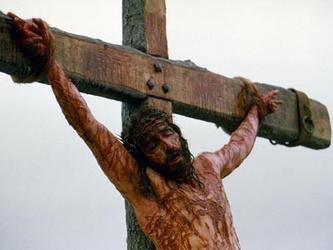The Call of Death
/
Do you see the horizon up there? We must be near the top. Suddenly I have the sinking feeling that I am about to approach a beloved's deathbed. I know that he is in agony, and I am afraid of what I will see. I have no choice but to enter because I love him, and I want to be near him in his suffering. I want to hold his hand and read psalms to him. I brace myself as I walk closer and closer to the room where torture does its work.
It is said that anticipation is more powerful than the fulfillment of the thing, whether it be a joy or a suffering. Perhaps I should stay in this moment, feel the cool breeze on my face, and not anticipate the coming crucifixion. After all, I am not there yet; I only see a glimpse of it through the heavily wooded horizon. Friday will come whether or not I suffer this anticipation. I could look down at the earth and pretend that I don't have to walk through the valley of the shadow of death.
I am beginning to feel weak and a little dizzy. This is familiar; it is my body telling me that the end is near.
Death of the body is widely considered the zenith of disaster. What could be worse than being torn away from this beautiful earth and loved ones? A slow and very painful death, or murder, are horrid ways to die. Escalating tortuous pain and the public humiliation of crucifixion are unimaginably awful.
To watch someone we love dearly, our son, our brother, or our best friend, being crucified, draws us into his suffering and humiliation. What can be worse; to lose him or to be him? We don't know.
Jesus Christ was the only person in the world who was born to die. You and I are born to experience life with all of it joys and sorrow, choices and lessons. It was to die that Jesus left the power and glory of divinity. He left the calm to enter our chaos. Dying was the only thing God could not do without our human body.
Adam and Eve were not killed. They committed a slow suicide. They chose to mistrust God. He warned them. They didn't believe the warning. Mistrust, thinking that eating of the knowledge of good and evil would make them happier actually separated them from the source of life, their God and guide. Death of the body was the physical effect of their distrust which separated them from the Creator of Life, our God.
Jesus forced the crucifixion on Himself in order to go to the place where mistrusting humanity naturally went when their mortal bodies suffered the final consequence of mistrusting God. Like Moses forcing Pharaoh to release God's people from the chains of Egypt, Jesus had to force Hades to release humankind from the chains of sin and death. No human soul dies. We were made in the immortal image and likeness of the source of life. Only the human body dies. Jesus knew that. The captive souls in Hades needed to be reunited with God. They had known good and evil long enough.
Jesus didn't become human to be able to eat fish and honey, or to make friends and enemies with magic tricks and breaking rules. He became human to unlock the gates of Hades and free the prisoners, and to free all of us on top of the earth from the deadly effect of mistrusting God.
The yoke of death, which is separation from God and from our loved ones will soon be replaced with a lifeline. Ironically, the lifeline is the death of Christ on the cross. Hold on tight.
